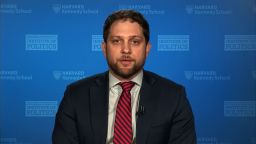Editor’s Note: Joshua Geltzer was senior director for counterterrorism at the National Security Council staff from 2015 to 2017 after serving in other roles at the NSC and Justice Department during the Obama administration. Jon Finer was chief of staff and director of policy planning for Secretary of State John Kerry. The opinions expressed in this commentary are theirs.
Story highlights
Authors: Do it yourself is Trump's message for countries overseas
It's fine to press others in burden-sharing, but US can't risk retreat from leadership, they say
Late last month, in the wake of President Donald Trump’s visit to Europe, German Chancellor Angela Merkel declared that Europe could “no longer rely on others” and must “really take our fate into our own hands.”
On Tuesday, Canadian Foreign Minister Chrystia Freeland pointed to Merkel’s comments and said, referring to America, “The fact that our friend and ally has come to question the very worth of its mantle of global leadership puts into sharper focus the need for the rest of us to set our own clear and sovereign course.”

If Trump succeeded in conveying any coherent message to the world amid the hand-slapping, orb-glowing and prime minister-shoving of his first overseas trip and its immediate aftermath, it was this: Do it yourself. If you’re a Middle Eastern country, take care of terrorism yourself. If you’re a NATO country, handle Russia yourself. If you’re a low-lying country or city along the coast, deal with climate change yourself.

This isn’t a new theme for Trump. It seems to be what he means by “America First.” It’s his message to China regarding North Korea: Fix it. It’s his message to Mexico regarding the wall: Pay for it. And so on.
In case anyone had missed the point, Trump national security adviser H.R. McMaster and National Economic Council Director Gary Cohn took to the pages of The Wall Street Journal recently to make clear that the new President expects other countries to pay any price and bear any burden that the United States doesn’t feel like shouldering in other parts of the world.
In their most ferociously Hobbesian moment, McMaster and Cohn wrote: “The president embarked on his first foreign trip with a clear-eyed outlook that the world is not a ‘global community’ but an arena where nations, nongovernmental actors and businesses engage and compete for advantage. We bring to this forum unmatched military, political, economic, cultural and moral strength. Rather than deny this elemental nature of international affairs, we embrace it.” In other words, it’s now every country for itself out there.
In fairness to Trump, the basic idea of getting other countries – especially rich and powerful ones – to bear more of the burden for addressing international challenges is neither a bad idea nor a new one. That concept has, at times, animated presidents of both parties, especially since the end of the Cold War. President Bill Clinton pushed Western Europe to help Eastern Europe catch up after the Berlin Wall fell. President George W. Bush pushed Pakistan to address terrorist threats emanating from its own backyard. President Barack Obama pushed the Europeans to contribute more troops to Afghanistan and to sanction Iran’s nuclear program.
But there’s something very different between this longstanding, bipartisan effort and Trump’s approach. Other presidents have understood that getting partners to step up requires the United States to step up, too, with the types of capabilities that only America can bring to bear. Trump, however, isn’t offering anything – he’s just browbeating others and telling them to do it themselves. The former approach was burden-sharing. Trump’s is simply unburdening ourselves of the world’s problems – which, alas, we can’t afford to do.
Getting others to do more that we want done in the world has been and should be a priority in US foreign policy. We contributed to those efforts while at the National Security Council and State Department, respectively. Providing the right set of support, assurances and veiled threats to motivate critical efforts by Syrian Kurds on the ground against ISIS while maintaining Turkish support for the counter-ISIS campaign occupied a great deal of time for both of us.
Similarly, we helped coordinate strategic use of the multibillion-dollar Counterterrorism Partnerships Fund, designed precisely to get others to step up their efforts against terrorists posing a threat to us and our partners. Getting China more invested in solving global problems such as the Ebola crisis and climate change was a major component of our strategy for ensuring that a rising global power would play a more responsible role on the world stage.
In these and other cases, the United States did not pass the buck to other nations but focused our efforts on unique capabilities only we could offer. Thus, the Syrian Kurds have made critical advances against key ISIS strongholds because the United States has provided carefully synchronized precision strikes from the air – the type of air support that only the United States is able to provide.
Likewise, investing heavily in partners’ counterterrorism efforts has yielded progress in areas such as the Lake Chad Basin region in Africa because the United States has paired that investment with sharing the type of intelligence and training that only America’s collection resources and high-end counterterrorism military units can provide.
While China took on Ebola with its largest-ever response to an overseas health emergency, the United States deployed medical professionals and 3,000 troops to West Africa to help contain an epidemic experts had predicted could kill more than 1 million people. And while China made a historic leap from climate change skeptic to climate action champion, American diplomats and technical experts leveraged an unparalleled network of international relationships to bring other major carbon emitters into the historic Paris climate accord.
Telling other countries to do more because we’ll focus on what we do best makes sense – and it works, in a world defined by cooperation for the benefit of all, rather than zero-sum competition. But that hasn’t been Trump’s approach. He’s simply told leaders from the Middle East to Europe to do more, spend more, take on more – so we can do less, spend less and take on less. What’s in it for them?
Some have argued that Trump’s approach will force these countries to step up because they’ll realize the United States won’t be there for them. That might prove true in certain limited instances. For example, Merkel’s comments may, in fact, be a sign that NATO members will start spending more on their own security.
But, usually, unburdening ourselves rather than burden-sharing won’t work out to our liking. There are reasons other countries haven’t invested in ways we’d like. Maybe it’s domestic politics; maybe it’s differing threat perceptions; maybe it’s simply limited resources. Trump’s efforts to browbeat are unlikely to overcome these limitations.
Without saying what the United States will offer, it’s hard to see other countries making materially greater investments themselves. And, for the issues on which we care more than those other countries, we’ll likely see less from them.
Take China: No one’s vision – neither Democrats’ nor Republicans’ – involved ceding global leadership to Beijing; rather, the goal has been to manage China’s rise by investing it in responsible global leadership alongside (and guided by) the United States. Trump’s approach seems instead to involve handing off the world as we withdraw from it.
It’s a dangerous enough world to navigate through a “do it together” foreign policy of the type presidents of both parties have cultivated for decades. But with the gravest problems we face unbound by borders – whether or not they are fortified by walls – it will be even more dangerous with Trump telling other countries to “do it yourself.”
Almost 20 years ago, the Clinton administration coined a phrase that encapsulated the essential nature of American global leadership, dubbing the United States “the indispensable nation.”
It was a phrase laden with more than a dash of hubris and has sometimes led to unfortunate results, but the nearly two decades since have borne out those words. Administrations of both parties have operated on the assumption that big global problems require the United States to lead, even as we worked hard to ensure partners did more of their share.
Our time in government convinced us that’s correct. While new rivals, such as China, have risen, and old rivals, such as Russia, have re-emerged, it remains the case that virtually no one looks to them, or anyone else, to lead the response to today’s greatest challenges we face, from climate change, to epidemics, to terrorism.
That may not last. One of many tragic results of the Trump era may be to make America dispensable again.





